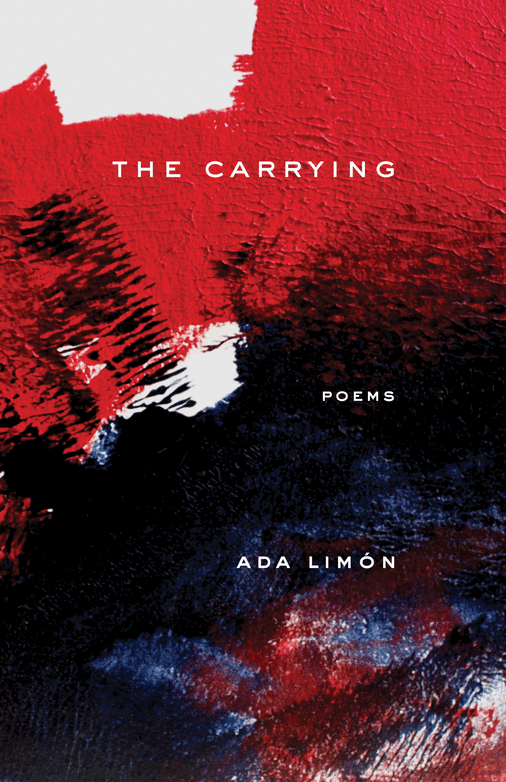
REVIEW:
The Carrying: Poems by Ada Limón
Runestone, Volume 5

REVIEW:
The Carrying: Poems by Ada Limón
Runestone, Volume 5

The Carrying: Poems
Milkweed Editions
ISBN: 978-1-57131-512-0
Published August 2018
Pages: 120
Reviewed by Skyler Kane
In a 2014 interview with Compose Journal, poet Ada Limón confessed that most of her poems are autobiographical and four years later with the release of her latest collection, The Carrying, this clearly still holds true. The topics of her poems in this work span anywhere from conflictions regarding her own identity to her struggles with infertility, all seeming to work towards a collective goal of encapsulating who, exactly, is Ada Limón.
As is prevalent in her work, Limón struggles with her identities both as a woman and as a member of the Latinx community. She addresses these identities best in two poems that are actually ordered back to back in The Carrying, the first of which being “The Contract Says: We’d Like the Conversation to be Bilingual.” In this, Limón dictates the other side of the conversation where people try to place her in boxes of identity, often simply so they can check off a diversity box, or make themselves feel better. At the end of the poem she writes in the voice of her conversationalist:
“…Don’t mention your father
was a teacher, spoke English, loved
making beer, loved baseball, tell us
again about the poncho, the hubcaps,
how he stole them, how he did the thing
he was trying to prove he didn’t do” (73).
Her father, and by extension she herself, was not allowed to be both American and Mexican. In her interview from 2014, Limón admitted to not speaking Spanish and seeing herself as more than just Mexican, claiming, “I’m Irish, and Scottish, and German too. Part lion. Part dragon. Depending on the day.” Limón is clearly dissatisfied with the idea of a singular identity, finding that it falls short of the full truth.
In the following poem, “It’s Harder,” Limón addresses some harsh truths about being a woman. She paints a scene of gestures seemingly innocent, but intimidating to any woman, such as “…a raised / eyebrow at the passing minuscule skirt, a wick / snuffed out at the evening’s end…” (74), both of these actions, to women, can insinuate threat of sexual assault. Limón concludes her poem by stating:
“I can’t remember which blue lake
has the whole train underneath its surface,
so now, every lake has a whole train
underneath its surface” (74).
Since women can never know which action is innocent, which man is dangerous, they are required to treat men like the lake with the train: if you can’t know which is a threat, they are all to be seen as threats.
Similar to her feelings on identity, Limón doesn’t let her poetry collection be singularly defined and has no problem breaching a diverse range of topics, including her struggles with infertility. In “The Vulture and the Body,” Limón describes passing animal carcasses on the side of the road, being preyed on by vultures, on the way to her fertility clinic. In this poem, Limón writes:
“The white coat has said I’m ready, and I watch as a vulture
crosses over me, heading toward
the carcasses I haven’t properly mourned or even forgiven
What if, instead of carrying
a child, I am supposed to carry grief?” (25)
Limón very clearly hasn’t come to fully accept her own infertility and struggles with this desire to have a child and her body’s inability to produce such a result. This theme is carried throughout her piece, although not always in such a somber tone. She does allow herself the room to wonder if maybe this might be the better life for her, as she asks in her concluding poem “Sparrow, What Did You Say?” This poem allows Limón’s piece to end on a positive note.
In fact, The Carrying in its entirety seems to act as a revolt against singularity. While she might mourn the absence of her husband in “The Burying Beetle,” she also wrote “Love Poem With Apologies for My Appearance” in which Limón is nothing but warm and grateful towards this husband that accepts all of her, and whom she truly believes when he says that he loves her. She even revolts against her own rebellion by opening The Carrying with a poem entitled “A Name.” In this poem, Limón paints a picture of Eve walking amongst the animals and naming them. Then Limón states:
“I wonder if she ever wanted
them to speak back, looked into
their wide wonderful eyes and
whispered, Name me, name me” (14).
In truth, The Carrying seems to act as Limón’s name, her identity, with all of its messiness and multiple facets and ever changing emotions. We all want to be named, want to be seen as all that we are, but the English—and arguably human—lexicon is incapable of providing simple definitions for the sum and total of the human experience. In this way, Limón uses her poetry to expertly capture the intersectionality of the human experience and the innate struggles we must all go through to make peace with our various selves.
SKYLER KANE
Hamline University
Skyler Kane is a junior at Hamline University studying Creative Writing. Fully under the belief that living just one life is sad and boring, Skyler has found a home in storytelling. She spends her days collecting books, imagining that one day she might see her name on one.
